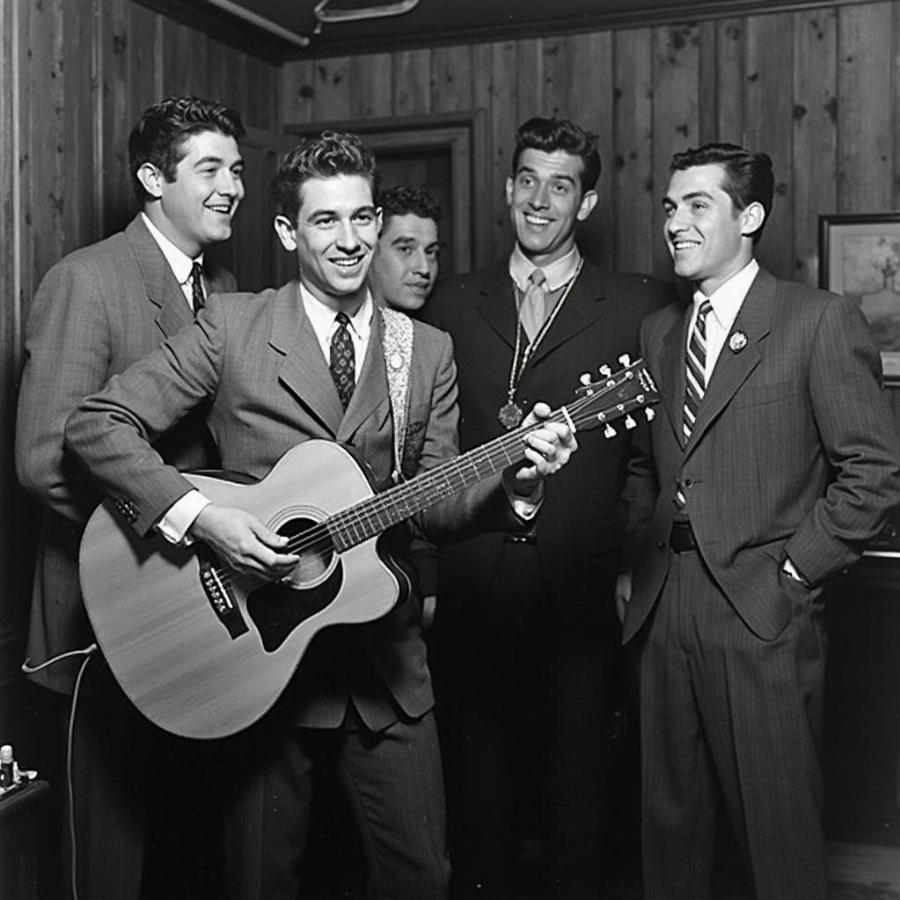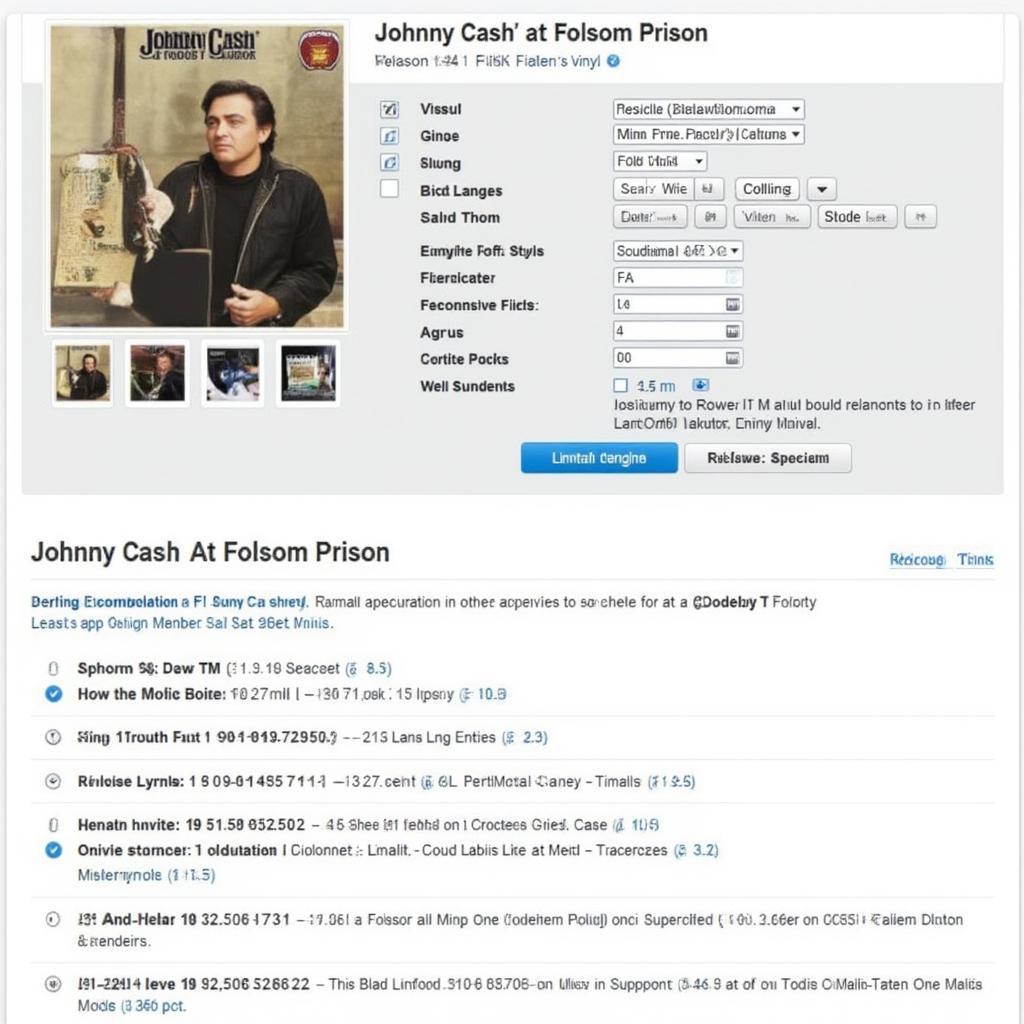Johnny Cash: An Enduring American Icon

Johnny Cash, the “Man in Black,” remains a powerful American icon, his music resonating across generations. From his humble beginnings in Arkansas to his outlaw image and unwavering empathy for the downtrodden, Cash’s life and music continue to captivate and inspire. His influence transcends genre, impacting country, rock and roll, folk, and gospel. This article explores the multifaceted life and career of Johnny Cash, delving into the elements that cemented his status as a true American legend.
The Making of an American Icon: Cash’s Early Life and Influences
Born J.R. Cash in Kingsland, Arkansas, in 1932, Cash’s early life was shaped by the hardships of the Great Depression and the gospel music that filled his childhood home. These experiences laid the foundation for his signature sound, a blend of raw emotion and simple storytelling. The family’s move to Dyess, Arkansas, a New Deal colony, instilled in him a deep understanding of poverty and struggle, themes that would become central to his music. The cotton fields of Dyess, the hymns sung in church, and the stories of his family all contributed to the artist he would become. His brother Jack’s tragic death profoundly impacted young Johnny, further shaping his worldview and artistic sensibility.
Cash’s musical journey began in the 1950s at Sun Records in Memphis, alongside Elvis Presley, Jerry Lee Lewis, and Carl Perkins, a period that defined the birth of rock and roll. While these artists embraced a rebellious spirit, Cash’s music carried a distinct sincerity and social consciousness, exploring themes of love, loss, faith, and redemption. He developed a unique sound that blended country, gospel, and blues, capturing the raw emotions of everyday life.

Walking the Line: Johnny Cash’s Rise to Fame
Johnny Cash’s career quickly soared with hits like “I Walk the Line,” “Folsom Prison Blues,” and “Ring of Fire.” These songs established him as a major force in American music, showcasing his distinctive baritone voice and storytelling prowess. “Folsom Prison Blues,” in particular, resonated with a wide audience, portraying the struggles of an incarcerated man with empathy and understanding. This marked the beginning of Cash’s enduring connection with the outsider, the downtrodden, and those living on the fringes of society. His willingness to address these themes cemented his status as a voice for the voiceless.
His rebellious streak and struggles with addiction contributed to his “outlaw” image, further solidifying his appeal to a generation questioning societal norms. He refused to be confined by genre conventions, blending country, rockabilly, and gospel, creating a sound uniquely his own. This defiance and authenticity resonated with fans who saw in him a reflection of their own struggles and aspirations.
The Man in Black: A Champion of the Underdog
Cash’s identification with the marginalized extended beyond his music. He became a staunch advocate for prisoners’ rights, famously performing at Folsom Prison and San Quentin. These performances weren’t just concerts; they were acts of solidarity, acknowledging the humanity of those often forgotten. His advocacy for Native American rights further underscored his commitment to social justice. He used his platform to raise awareness about their plight and to challenge the injustices they faced.
“My father was a sharecropper,” says renowned music historian Dr. Charles Miller, “and Johnny’s music resonated with him deeply. It spoke to the struggles of working people, offering a sense of hope and understanding.”
His attire, the simple black clothing he adopted as his uniform, symbolized his empathy for the poor and oppressed. The “Man in Black” wasn’t just a stage persona; it was a reflection of his values and his commitment to giving voice to the voiceless. This powerful image resonated deeply with audiences, further solidifying his status as an American icon.
A Legacy of Authenticity: Johnny Cash’s Enduring Impact
Johnny Cash’s influence on American music is undeniable. His music transcended genre boundaries, impacting artists across the spectrum from country to rock and roll. His raw honesty and authenticity continue to inspire musicians today, reminding them of the power of storytelling and the importance of connecting with audiences on a deeper level. His songs remain timeless, resonating with each new generation that discovers his music.
“Johnny Cash’s music is more than just entertainment,” explains music journalist Sarah Evans. “It’s a testament to the human spirit, a chronicle of our struggles and triumphs.”
The American Recordings: A Final Chapter and a Renewed Legacy
In the later years of his career, Cash’s work with producer Rick Rubin on the “American Recordings” series introduced him to a new generation of fans. These stark, stripped-down recordings showcased the raw power of his voice and the depth of his artistry. The American Recordings revitalized his career, demonstrating the enduring power of his music.
Johnny Cash, the American icon, remains an enduring figure in American culture. His music, his life, and his message of empathy and resilience continue to inspire and resonate with audiences worldwide. From his humble beginnings to his iconic status, Johnny Cash embodies the spirit of American music.
Conclusion: Johnny Cash – An American Icon Forever Etched in Our Hearts
Johnny Cash, the American icon, remains a powerful force in music and culture. His journey from the cotton fields of Arkansas to the stages of the world is a testament to the power of authenticity and the enduring appeal of a true American voice. His legacy continues to inspire, reminding us of the importance of empathy, resilience, and the power of music to unite us all. Explore the music of Johnny Cash, and discover the heart and soul of an American icon.
FAQ: Johnny Cash, the American Icon
-
Why is Johnny Cash considered an American icon? His music reflects the American experience, addressing themes of hardship, redemption, and social justice. His authenticity and empathy resonated with a diverse audience, solidifying his status as a cultural icon.
-
What is Johnny Cash’s most famous song? While numerous songs contributed to his fame, “I Walk the Line,” “Ring of Fire,” and “Folsom Prison Blues” are among his most recognizable and iconic hits.
-
What genre of music did Johnny Cash play? His music defied easy categorization, blending country, rock and roll, folk, gospel, and blues, creating a unique and enduring sound.
-
Why was Johnny Cash called the “Man in Black”? He adopted the all-black attire as a symbol of solidarity with the poor and oppressed, reflecting his deep empathy and social consciousness.
-
Where did Johnny Cash grow up? He was born in Kingsland, Arkansas, and spent his formative years in Dyess, Arkansas, a New Deal colony that profoundly influenced his music.
-
What was the significance of Johnny Cash’s Folsom Prison concert? The concert demonstrated his empathy for prisoners and his belief in their humanity, solidifying his image as a champion of the underdog.
-
What is the American Recordings series? This series of albums, produced by Rick Rubin, featured stripped-down recordings of Cash’s music, revitalizing his career and introducing him to a new generation of fans.
-
How did Johnny Cash’s early life influence his music? His childhood during the Great Depression, his family’s strong religious beliefs, and his brother’s tragic death shaped his worldview and his musical themes.
-
What is Johnny Cash’s legacy? His music continues to inspire and resonate with audiences worldwide, reminding us of the power of authenticity, empathy, and the enduring spirit of American music.




